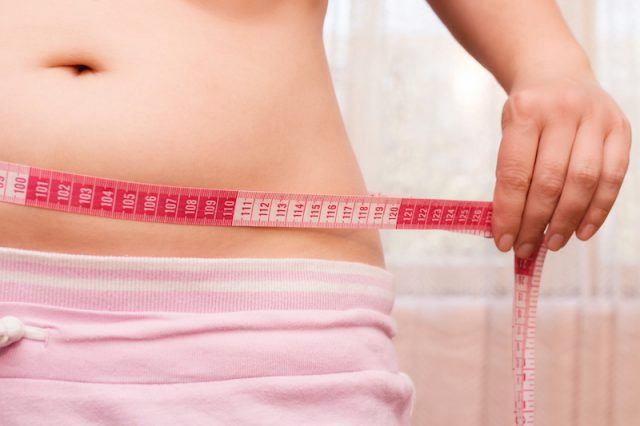Though it might feel like one at times, menopause isn’t an illness. It’s a natural part of aging. On average, women in their early 50s start noticing symptoms like hot flashes and mood swings as their bodies signal the end of their reproductive years. If you’re nearing that point yourself, your body’s about to take you on a journey — here’s what to expect over the next two to 10 years.
Hello, weight gain
 It’s not impossible to control menopausal weight gain. | Marina Zg/iStock/Getty Images Plus
It’s not impossible to control menopausal weight gain. | Marina Zg/iStock/Getty Images PlusMany women gain weight at menopause, Anahad O’Connor writes in The New York Times. Whether it’s due to hormone changes, genetics, or it’s simply an unfortunate side effect of aging, it does happen — but it doesn’t have to. Women who are more likely to gain weight during menopause often have to put in extra effort to avoid it, but in many cases, proper diet and exercise helps.
Goodbye, sex drive
 Your sex drive can be unpredictable as you age. | Ridofranz/iStock/Getty Images Plus
Your sex drive can be unpredictable as you age. | Ridofranz/iStock/Getty Images PlusSome women experience an increase in libido during menopause, says Healthline, but many notice a decline. Hormone changes can affect your mood and make you less interested in sex. Decreased estrogen can also affect vaginal blood supply, causing dryness and atrophy that can cause pain and discomfort.
Exercise is one natural remedy you can use to improve your mood and increase your libido. Hormone therapies, though not always recommended, are also an option to treat many menopause symptoms.
Hormones (or lack thereof) might make you moody
 Feeling moody during menopause? Let your doctor know ASAP. | Spwidoff/iStock/Getty Images Plus
Feeling moody during menopause? Let your doctor know ASAP. | Spwidoff/iStock/Getty Images PlusUnfortunately, healthy eating and regular exercise are easier said than done when you’re exhausted and moody. According to the Australian Menopause Centre, mood swings are a normal side effect of menopause. As your body’s estrogen levels drop, you produce more serotonin, a hormone that regulates mood. But feelings of fatigue, irritability, and depression can continue after menopause, says Everyday Health. Thankfully, those symptoms are mostly self-manageable.
RIP periods
 At least you won’t need these anymore. | Matka Wariatka/iStock/Getty Images Plus
At least you won’t need these anymore. | Matka Wariatka/iStock/Getty Images PlusA woman officially completes menopause a year following her last menstrual cycle. The American Congress of Obstetricians and Gynecologists says as you approach menopause, your periods will likely become lighter and less frequent. Then, as your body produces less and less estrogen, this cycle stops altogether. Any bleeding after menopause is not normal, so you should see your doctor immediately if you notice it.
You can’t sleep
 Your sleep schedule might face disruption. | Warren Goldswain/iStock/Getty Images Plus
Your sleep schedule might face disruption. | Warren Goldswain/iStock/Getty Images PlusMenopause and sleep may not play well together. The National Sleep Foundation says insomnia is a common symptom of menopause. Even post-menopausal women — 61% of them — report they still aren’t satisfied with their sleep. Hormone changes can cause hot flashes and night sweats, which can disturb your sleep and throw everything else off-balance. Though there isn’t much you can do to relieve these symptoms, it can’t hurt to practice good sleeping habits so you can make the most of the resting hours you get.
Your heart isn’t as strong as it used to be
 Make sure you regularly talk to your doctor about your heart health. | Ridofranz/iStock/Getty Images Plus
Make sure you regularly talk to your doctor about your heart health. | Ridofranz/iStock/Getty Images PlusAccording to the American Heart Association, as your body’s estrogen levels decrease, your risk for heart disease rises. Hormone changes could be to blame, but as the body ages, risk factors like blood pressure and LDL cholesterol might also contribute. Both factors tend to increase during menopause, which is why heart-healthy lifestyle choices are especially important for women over 50.
Beware — your bones might betray you
 Low impact exercises like water aerobics are easy on the joints. | Ridofranz/iStock/Getty Images Plus
Low impact exercises like water aerobics are easy on the joints. | Ridofranz/iStock/Getty Images PlusWomen are at higher risk of osteoporosis during and after menopause, says Cleveland Clinic. Low estrogen levels and age can decrease bone mass, and bones can begin to break down faster than your body can build them back up. This increases your risk for fractures and collapsed vertebrae. Unfortunately, many women don’t know they have osteoporosis until they break a bone. To help prevent and treat bone density loss, try weight-bearing exercises, such as weight training, walking, hiking, jogging, climbing stairs, tennis, and dancing.
This content was originally published here.







